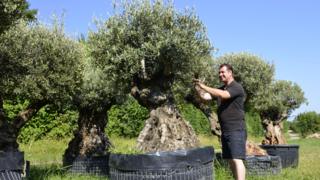Image copyright
Getty Images
Oliver trees have become popular with gardeners in recent years
Severe restrictions will be placed on imports of some very popular trees and plants in an effort to halt a deadly infection.
Xylella fastidiosa has wreaked havoc on olive plantations in parts of Italy and has also been found in France and Spain.
To prevent the disease spreading to the UK, imports of olive trees and lavender bushes will now be curtailed.
There will also be restrictions on almond, rosemary and oleander shrubs.
Xyllela is a bacterium that has caused significant damage to olive trees in Italy over the past seven years.
Image copyright
Getty Images
Infected olive trees being torn out of the ground in Italy
Spread by spittlebugs and other sap-sucking insects, the resulting disease has no treatment and it is said to have cut Italy’s olive harvest to its lowest level in 25 years.
A recently published study suggested that the infection could cause billions of euros in damages if it spreads further into olive-producing regions of Spain and Greece.
But Xylella is not just a disease of olive trees.
According to experts, some 560 species in 72 plant families can be affected by the infection.
For the UK, Xylella poses a threat to iconic species including oak, elm and plane trees.
Image copyright
Getty Images
Lavender will be hit with tough new restrictions on imports
To prevent the spread of the disease, the Department for the Environment, Food and Rural Affairs (Defra) is now placing heavy restrictions on some species.
Imports of Coffea (coffee plants) and Polygala myrtifolia will be banned completely, while much tougher requirements will be placed on other high-risk hosts including Olive, Almond, Oleander, Lavender and Rosemary.
These new restrictions put the UK ahead of the rest of Europe in its efforts to curb Xylella.
In a letter, Defra said that “there remains an unacceptable level of pest risk and we are introducing national measures in the absence of EU requirements”.
Experts say the new limitations will have a substantial effect.
Image copyright
Getty Images
Imports of Oleander will also be restricted
“They’re quite stringent requirements and they will very much impact the trade flows of things like olive and lavender where huge quantities are moved around in the horticultural trade,” said Dr Gerard Clover, from the John Innes Centre in Norwich, who is involved in the UK research initiative called BRIGIT, designed to monitor the Xylella pathogen.
Tens of thousands of olive trees are imported into the UK every year, while the numbers of lavender and rosemary plants are higher still.
Some of those involved in the plant breeding industry say the restrictions will mean a ban in practice – with implications for gardeners.
“There is a new requirement for exporters supplying plants to the UK to show that the area 200 metres around their place of production has been free from Xylella for at least one year, with official test results to prove it. This is impossible to comply with,” said Graham Spencer from Plants for Europe, an independent plant breeders agent.
“Furthermore, it is not possible to switch to domestic British production. There is very little propagation of lavender and rosemary in the UK – nearly all growers rely on the international supply of unrooted cuttings, young plants or finished plants,” he added.
The horticultural industry is generally in favour of the move to restrict imports, recognising the threat posed by Xylella.
Image copyright
Getty Images
Rosemary is one of the plants facing new restrictions
However, business owners are far more concerned with the immediate threat to their livelihoods from the coronavirus. If they aren’t supported in that, they argue, then the government plans to control Xylella might backfire.
“We have proposed to government a stock compensation scheme – highlighting the benefits of the Dutch grower compensation model – and the re-opening of garden centres to help British growers’ businesses to survive,” said James Clark, from the Horticultural Trades Association.
“Without this immediate financial assistance, we will be facing a significantly reduced British grower sector, resulting in the UK being more dependent on the import of plants and, with it, all the potential additional pests and disease risks this carries.”
Follow Matt on Twitter.
















